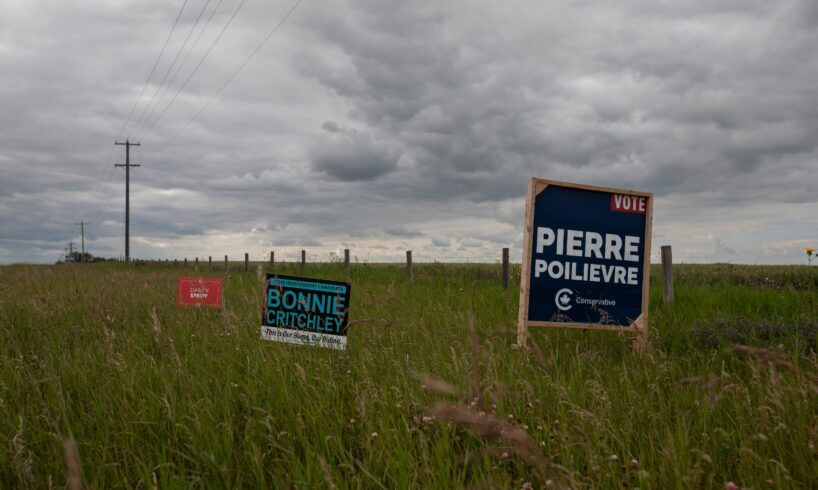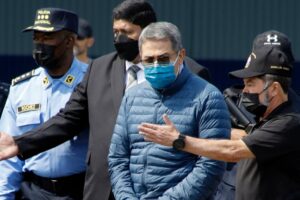
Open this photo in gallery:
There are 214 candidates running in Monday’s Battle River-Crowfoot by-election, where Conservative Leader Pierre Poilievre is hoping to win a seat.AMBER BRACKEN/The Canadian Press
Former chief electoral officer Jean-Pierre Kingsley says an electoral reform protest known as the Longest Ballot Committee is unwarranted and unjustified, and is reiterating his long-standing call for politicians to change election laws to address it.
There are a record 214 candidates running in Monday’s Battle River-Crowfoot by-election, where Conservative Leader Pierre Poilievre is hoping to win a seat. Of those names, 201 are linked to the committee.
The number of candidates prompted Elections Canada to switch to a write-in ballot – a move Mr. Kingsley said he supports. Lists of candidates will be available for electors, according to Elections Canada, and as long as the intent is clear spelling mistakes will not count.
Opinion: Why I added my name to the long ballot in Pierre Poilievre’s by-election
It could be the last time the Longest Ballot Committee can hold at least this style of protest. Mr. Poilievre has called for changes to election laws to put an end to what he has said is a “scam.” Government House Leader Steven MacKinnon’s office, while non-committal, has said the government shares the concerns about the longest ballot initiative and is currently examining the issue.
“I think it’s an abuse of process,” Mr. Kingsley said, referring to the protest. “People have grievances, but in our democracy, we have ways of expressing them.”
Mr. Kingsley was chief electoral officer from 1990 to 2007.
If the committee organizers wanted to make a statement, he said they could have gathered 250 signatures to form a political party with a candidate and a platform focused on the protest’s demands. He added they could also support an existing party that aligns with their goals.
Wood Buffalo
National Park
THE GLOBE AND MAIL, SOURCE: ELECTIONS CANADA
Wood Buffalo
National Park
THE GLOBE AND MAIL, SOURCE: ELECTIONS CANADA
Wood Buffalo
National Park
THE GLOBE AND MAIL, SOURCE: ELECTIONS CANADA
Committee organizer Tomas Szuchewycz said he planned to protest even if changes are implemented.
Mr. Szuchewycz said in a statement that the “only abuse of process is politicians being in charge of their own election rules.” The group says election laws should be decided by an independent body, such as a citizens’ assembly.
“I don’t see any value in making a party or supporting any existing party, because – as we’ve seen countless times – a party that wins under first-past-the-post, keeps first-past-the-post no matter what they promise,” he said.
Mr. Kingsley said he publicly recommended changes months before the last Parliament was dissolved. Proposed legislation should only address that issue, he added, making it more likely to pass.
Mr. McKinnon’s office referred to its previous statement when asked if this issue would be addressed in the next sitting.
The by-election is the second time the group has protested a race involving Mr. Poilievre.
The committee also protested his former Ottawa riding in April, which had 84 candidates total. Mr. Poilievre lost that race. It has also protested races where the Liberals are historically strong.
Open this photo in gallery:
Jean-Pierre Kingsley was Canada’s chief electoral officer from 1990 to 2007.Tom Hanson/The Canadian Press
In most cases, Elections Canada says candidates each need 100 signatures from people in the riding in order to be nominated. The Globe reported this week that many people signed 250 nomination forms.
Mr. Kingsley said if officials had known that people would sign multiple nomination forms when making that rule, they would have likely imposed a rule against doing so.
Current Chief Electoral Officer Stéphane Perrault has proposed a ban on voters signing multiple nomination papers, while also arguing that doing so should not invalidate those nomination papers.
Mr. Kingsley agreed with that move, as well as a proposal from Mr. Poilievre to require candidates to have unique financial agents. All of the longest ballot candidates have the same one.
Mr. Poilievre has also proposed raising the signature threshold to 0.5 per cent of any given riding’s population. Mr. Kingsley said he thinks “we’ve been well-served” by the 100 signature rule, but is open to a debate about it.
Elections Canada said Wednesday that about 14,453 people voted in the by-election’s advanced polls, which ran from Aug. 8-11. Roughly the same number, 14,434, cast ballots in the April federal election’s advanced vote.





